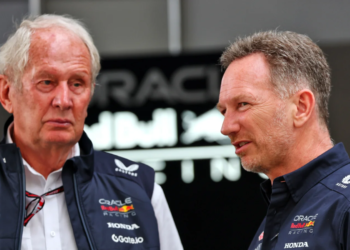Every toy within the Red Bull pram has been thrown out since the start of the 2015 Formula 1 season. The Milton-Keynes based squad, who languish fourth in the constructors’ championship, a full 74 points behind Williams, have (or rather Renault) failed to adapt to the turbo-hybrid regulation changes which have led to threats of quitting the sport.
Whilst many would be forgiven for accusing Red Bull of a “cant win, wont play” mentality, unfortunately threats to pull out of F1 due to being uncompetitive are not uncommon.
Ferrari’s team boss Maurizio Arrivabene was the latest critic of the Austrian energy drink company, stating: “It is easy to be happy when you win four championships and easy to complain when you are not winning.
“You have to accept when something goes wrong and when it goes right.”
Whilst the Italian’s comments may be true, his team’s privileged position in the sport as number one challengers to the pace setting Mercedes have helped eradicate the memories of their woes prior to the 2015 season.
Ferrari’s former president Luca di Montezemolo threatened to quit the sport on a number of occasions during their difficult spell between 2011 and 2014.
Di Montezemolo even suggested back in 2011 that a breakaway series could be formed in the aftermath of Pirelli’s entry into the sport and their production of quick to degrade tyres.
“We have gone too far with artificial elements,” the Italian stated.
“It’s like, if I push footballers to wear tennis shoes in the rain. To have so many pit stops – listen, I want to see competition, I want to see cars on the track. I don’t want to see competition in the pits.
“In the last race there were 80 pitstops. Come on, it’s too much. And the people don’t understand anymore because when you come out of the pits you don’t know what position you’re in.
“I think we have gone too far with the machines, too many buttons. The driver is focalizing [focusing on] the buttons, when you have the authorization to overtake. We have gone too far.
“Ferrari will push a lot with the authority – with the respect that we have to the federation and the other teams – to avoid going too far with F1. Because I think it can create problems for the television people and on the racetrack.”
The sport’s most successfull teams are not the only constructors to quit Formula 1. Some of the globe’s biggest car manufacturers have entered and swiftly exited the sport after failing to establish themselves as regular title contenders.
BMW, who held a full works team from 2006 until 2009, were making real gains in F1 which included an unlikely victory at the 2008 Canadian Grand Prix with Robert Kubica.
However, with heavy investment in the flawed 2009 KERS system, the German marquee pulled out of the sport all together.
“Of course, this was a difficult decision for us, but it’s a resolute step in view of our company’s strategic realignment,” Dr Norbert Reithofer, the CEO of BMW, stated in 2009.
“Premium will be increasingly defined in terms of sustainability and environmental compatibility. This is an area in which we want to remain in the lead.
“We are continually reviewing all projects and initiatives to check them for future viability and sustainability.”
Japanese giants Toyota, who brought a huge budget with them when they entered F1 in 2002, followed suit that same year, however their exit was aided by their worst financial year in company history.
“It was a tough decision because we are betraying the expectations of fans,” Akio Toyoda, grandson of Toyota’s founder, added.
“I apologise to our fans from the bottom of my heart. I made the decision myself.”
Red Bull’s current engine supplier Renault pulled out as a full manufacturer back in 2010 even after claiming two world titles with Fernando Alonso in 2005 and 2006. The French car manufacturer stayed in the sport as an engine supplier and still enjoyed incredible success, taking four consecutive world titles with Red Bull.
However, on the back of a disappointing 2014 and difficulties with the current 2015 power train, Renault are once again on the brink of pulling out of the sport all together.
Renault’s Cyril Abiteboul confirmed earlier this year that the French marquee was considering their options after a wave of criticism from Red Bull.
“I can confirm that we are looking at a lot of options, including getting out of Formula 1,” Abiteboul said in April.
“Honestly, if Formula 1 is that bad for Renault’s reputation, if we see that we struggle with the current formula; if Formula 1 is not delivering the value it costs to Renault – bearing in mind that when you have an engine supplier, you have no incentive to fund engine development – this is what we’re looking at.”
Whilst Red Bull’s current wave of threats may amuse most observers, taking into account their unprecedented success from 2010, the sport has a history of teams leaving after baron victory spells.
Whilst Dietrich Mateschitz, co-founder of Red Bull, may pull the carpet from underneath his team’s feet, F1 will always continue to thrive at the pinnacle of motorsport. Perhaps the Austrian firm should consider that they are not the first team to leave and they certainly will not be the last.






